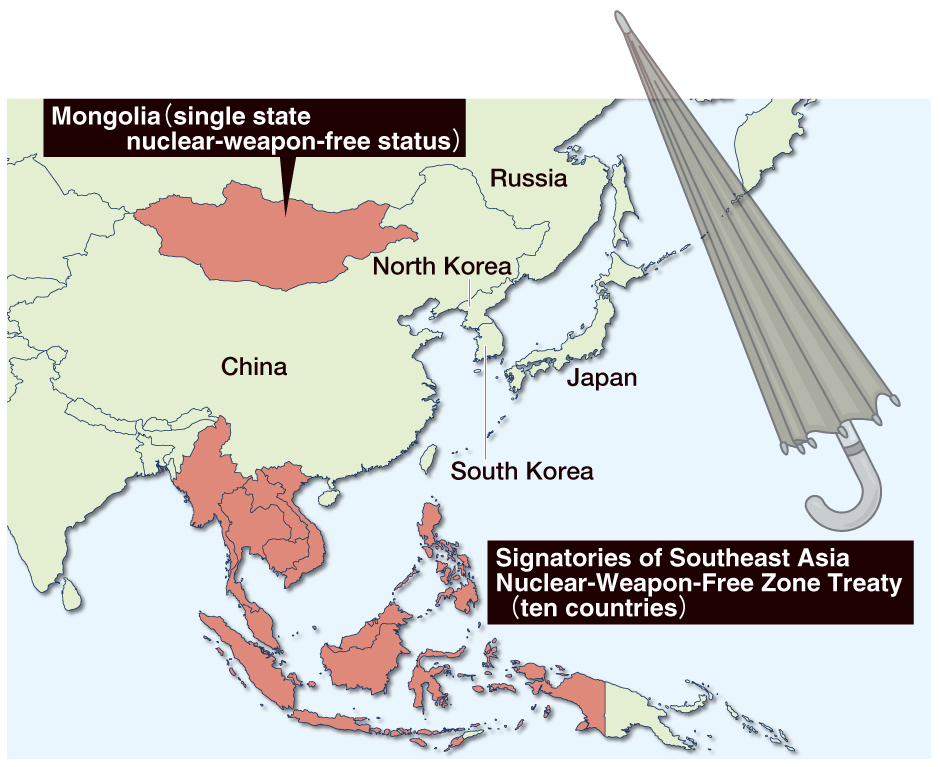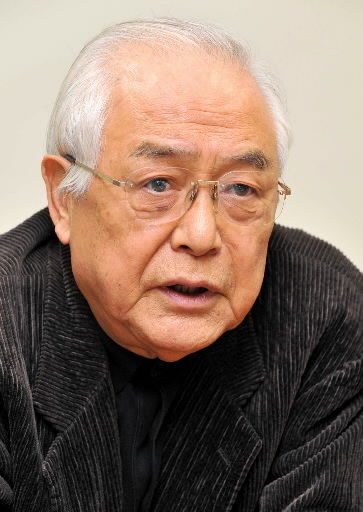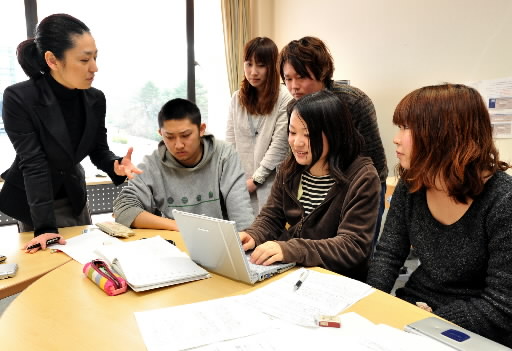Nuclear weapons can be eliminated: Special Series, Part 15
Mar. 11, 2010
Special Series: The Day the Nuclear Umbrella is Folded
Part 15: Japan should lead the world in nuclear abolition
by the "Nuclear Weapons Can Be Eliminated" Reporting Team
As the only nation to have suffered nuclear attack, Japan has seen its role as championing a world without nuclear weapons. But at the very same time, it has been relying on the U.S. nuclear deterrent to protect its own security.
It is now vital, from a moral standpoint, for Japan to end this double standard and its dependence on U.S. nuclear weapons. Due to the volatility of the Northeast Asian region, it would be all the more significant for Japan to take proactive steps to get out from under the "nuclear umbrella."
Folding the nuclear umbrella is indeed possible. This article depicts just such a scenario.
Wish of the A-bomb survivors to prevent a similar tragedy
Relying on the nuclear umbrella amounts to accepting the existence and the role of these weapons. The Japanese government has staked its security on a policy of nuclear deterrence in which the "first use" of nuclear weapons is permitted. The A-bomb survivors (hibakusha) interpret that stance as meaning the government accepts the possibility that others in the future might experience the same cruel fate as the victims of the atomic bombings suffered.
"Nuclear weapons are 'arsenals of evil.' It's outrageous that Japan, the world's only victim of nuclear weapons, is relying on them," said Terumi Tanaka, secretary general of the Japan Confederation of A-and H-Bomb Sufferers Organizations.
Mr. Tanaka often has opportunities to convey to the Japanese government what the A-bomb survivors think in the areas of relief for hibakusha and nuclear disarmament. Mr. Tanaka recently exchanged views with government officials at the International Commission on Nuclear Non-proliferation and Disarmament (ICNND) and became acutely aware of their deep confidence in nuclear weapons.
"A nuclear deterrent is designed to be used when necessary. Japan should take the initiative to give up its dependence on this deterrent," Mr. Tanaka argued.
Breaking away from the "vicious cycle" of an arms race
If one nation attempts to overpower other nations with force, they will respond by expanding their own arsenals, resulting in an escalating dependence on more powerful weapons.
"One dilemma of this security situation is the vicious cycle of an arms race. And Northeast Asia is now stuck in this vicious cycle," said Keiko Nakamura, secretary-general to the non-governmental organization Peace Depot at "The 4th Nagasaki Global Citizens' Assembly for the Elimination of Nuclear Weapons" held in Nagasaki in February.
Stopping this vicious cycle, simply by calling on North Korea to abandon its nuclear weapons while both Japan and South Korea maintain the U.S. nuclear deterrent, is an impossible aim. Instead, Japan should spearhead the effort to get out from under the nuclear umbrella. Such a course would be the key to establishing a security system in the Northeast Asian region that does not depend too heavily on military force.
Building trust will pave the way for nuclear abolition
"No matter how many times the Japanese government calls for nuclear abolition, the world will not take the appeal seriously as long as Japan argues that the nuclear umbrella is necessary," said Motofumi Asai, president of the Hiroshima Peace Institute of Hiroshima City University. According to Mr. Asai, he often felt the world's cold eye turned on Japan when he was working for the Ministry of Foreign Affairs (MOFA).
Japan must eliminate the double standard and declare to the world that it will no longer depend on the nuclear umbrella. As a result, says Mr. Asai, "Other Asian nations, including China, will finally believe that Japan is serious about building peace and security in the region." Japan's appeal for nuclear abolition would then be more convincing.
Promoting nuclear disarmament while preventing nuclear nations from deterring the effort
The nuclear weapon states each bear responsibility for nuclear disarmament. However, by shrugging off its own dependence on the nuclear umbrella, Japan would contribute to reducing the importance of nuclear weapons. To move forward with disarmament, such a reduction in the role of nuclear weapons is a central precondition.
The nuclear powers, particularly the United States, contend that one reason for maintaining nuclear weapons is the importance of providing their allies with the protection of the nuclear umbrella.
On February 19, 204 Japanese Diet members from various parties submitted a letter, jointly signed, for U.S. President Barack Obama, which calls for limiting the role of nuclear weapons to nuclear deterrence alone.
Hideo Hiraoka, a Lower House member of the Democratic Party of Japan (DPJ) from Yamaguchi's second constituency, met with John Roos, the U.S. ambassador to Japan, at the U.S. embassy in Japan. "We do not want Japan to play any part in deterring the U.S. effort for nuclear disarmament," Mr. Hiroaka said, in explaining the purpose behind the letter.
Persuading North Korea and China to abandon their nuclear weapons
By getting out from under the U.S. nuclear umbrella, Japan can call more forcefully for North Korea and China to give up their nuclear weapons. This effort could break the vicious cycle troubling Northeast Asia and work as a trigger to move the region into a more positive direction.
In asking the United States to provide the "negative security assurance," Japan's call for North Korea to abandon its nuclear weapons would be more persuasive. Under such an assurance, the United States would pledge not to use nuclear weapons against North Korea, nor intimidate the country with these arms. This would also make it possible to resume the Six Party Talks, which have stalled. At the negotiating table, Japan could also call on China to promote disarmament and give up its nuclear arsenal, removing any threat of a nuclear attack by China on Japan.
"By eliminating the threat each nation feels, we can end the Cold War configuration, which remains in Northeast Asia," stressed Mitsuo Kurosawa, a professor at Osaka Jogakuin College and a specialist in international disarmament law who chairs the Japan Association of Disarmament Studies.
After abandoning the nuclear umbrella, enacting a treaty for Northeast Asia
Once it abandons the nuclear umbrella, Japan can appeal to the world for the abolition of nuclear weapons without hesitation. Then, to ensure abolition, we should create a legally binding framework that bans the use, possession, and manufacture of nuclear arms.
Enacting a Northeast Asia Nuclear-Weapon-Free Zone treaty, a vision still on the drawing board, will be part of this effort. To realize this vision, the treaty would include Japan, South Korea, and North Korea in a nuclear-weapon-free zone and the United States, Russia, and China would be persuaded to pledge the "negative security assurance." To mitigate tension on the Korean peninsula, South Korea should be asked, too, to give up its dependence on the U.S. nuclear umbrella.
At the same time, efforts would proceed to abolish weapons of mass destruction from the Middle East and other areas and ultimately shield the whole earth with a nuclear-weapon-free zone.
The nuclear weapons convention that international NGOs are advocating would be another capable means of achieving nuclear abolition. Such a convention would declare a ban on all nuclear weapons, in addition to a prohibition on the use or threat of use of such arms. This outcome would be in line with the wish that the cities of Hiroshima and Nagasaki have long held.
Kenji Urada, a professor emeritus at Waseda University and an expert on constitutional law, said, "It is now time to take steps toward eliminating the paradigm of confrontation on our earth caused by maintaining the nuclear deterrent. This would pave the way for eliminating nuclear weapons and the threat they pose of annihilating the human race."
Increasing interdependence by building security along economic and diplomatic fronts
By enshrining the nation's three nonnuclear principles into law, Japan would be saying to the world that its security policy is not heavily dependent on nuclear weapons nor does it have any intention of going nuclear. Under these circumstances, Japan could increase its multilateral interdependence and build a security policy based on economics and diplomacy.
Akira Kurosaki, an associate professor at Fukushima University and an expert on international politics, points out, "Force alone cannot ensure security. A broad range of exchange, including in economic and cultural fields, will boost mutual confidence."
With military tension eased, the purpose of the Missile Defense (MD) system Japan has deployed against China and North Korea can be challenged. At the same time, other outcomes, such as cuts to the defense budget, would be anticipated.
Interview with former Hiroshima Mayor Takashi Hiraoka: How the A-bombed nation of Japan should act
In the Peace Declaration made on August 6, 1997, Takashi Hiraoka called on the Japanese government to make efforts to create a security framework that did not rely on the nuclear umbrella. The Chugoku Shimbun interviewed the former Hiroshima mayor, now 82, and asked his ideal image of the city and country which experienced nuclear attack.
Recognize the illegality of nuclear weapons
In 1996, the International Court of Justice (ICJ) issued an advisory opinion that "the threat or use of nuclear weapons would generally be contrary to the law." In the ICJ hearing process, I, as mayor of Hiroshima, delivered a statement that the use of nuclear weapons runs counter to international law. I believed I had to make clear that the dropping of the atomic bombs was wrong. Otherwise, nuclear weapons might be used again.
But the Japanese government displayed a different attitude. Before I made the statement, then Foreign Minister Yohei Kono asked me not to say that the use of nuclear weapons is against international law. The government gave priority not to the human point of view but to its consideration for the United States. The basis of my 1997 Peace Declaration was a criticism of this attitude.
Broader discussions on relations with other countries
In April 1998, when India was readying its nuclear tests, I visited the country to hold an atomic bomb exhibition. I urged the Indian Vice President at the time, Krishan Kant, to cancel the tests. He responded, "Japan is protected under the U.S. nuclear umbrella, so how can you tell other nations not to possess nuclear weapons?"
I was shocked. I came to believe very strongly that, if we are to make our voice persuasive in the world, the contradiction in connection with the nuclear umbrella must be resolved.
By getting out from under the U.S. nuclear umbrella, our means of resolving tension in the region can then be based on negotiations, not on military might. First, we should make the decision to step away from the nuclear umbrella and determine what is needed for the security of Japan. Of course, this is based on the assumption that Japan has maintained diplomatic relations with North Korea and the two nations are engaged in dialogue. At the same time, confidence building among all nations in the region must be promoted.
In Japan, broad discussions are needed on how to forge positive relations with area nations and how Japan-U.S. relations should evolve.
Hiroshima must display initiative
I feel some concern about the recent trend of depending on the popularity of U.S. President Barack Obama to advance the abolition of nuclear weapons.
Isn't attention being paid to only the most favorable aspects of his Prague address, while neglecting such other aspects as the emphasis he puts on maintaining nuclear deterrence or his skirting of the responsibility for the atomic bombings themselves? The higher our expectations are of Mr. Obama, the harder it will be to discern the true challenges we face in eliminating nuclear weapons.
We should not simply chant the slogan of nuclear abolition. We must reject not only nuclear arms but also armed conflict. Hiroshima should take the initiative in holding broad, open discussions on pursuing that end. Abandoning the nuclear umbrella is just one part of this larger process.
Takashi Hiraoka
Born in the city of Osaka in 1927, Takashi Hiraoka joined the Chugoku Shimbun in 1952. He served two terms as Hiroshima Mayor between 1991 and 1999. Mr. Hiraoka is currently chairman of C-has, an organization which promotes networking within the Chugoku Region.
Proposals from students of Hiroshima Shudo University: Establish new security framework
Proposals have been drawn up by six students of Hiroshima Shudo University on how to get out from under the nuclear umbrella. The students are taking seminars taught by Associate Professor Noriko Sado, whose expertise is international security.
As citizens of Hiroshima, we feel uncomfortable about the fact that Japan is protected by the U.S. nuclear umbrella, even after the end of the Cold War. However, to get out from under the nuclear umbrella, factors creating instability in the region must be addressed. These factors constitute the basis of Japan's dependence on nuclear weapons. In our discussions on the challenges and potential actions involving this issue, we considered both the ideal situation and the hard reality.
Why abandon the nuclear umbrella?
Japan is the only country to have experienced nuclear attack, and it has long appealed for the elimination of nuclear weapons. But its appeals are unconvincing as long as it is protected under the nuclear umbrella. At the same time, the security partnership between Japan and the United States has endured for more than five decades, and the bilateral partnership is too close to dissolve. Therefore, as a realistic way forward, Japan should seek to forge an alliance with the United States that does not rely on nuclear weapons.
Only after forging such a relationship can Japan exercise true leadership in the field of nuclear abolition.
Japan-U.S. relations
Simply telling the United States that we no longer want the nuclear umbrella extended over Japan might destabilize relations between the two countries. The United States may assume that Japan is rejecting all forms of U.S. assistance. Such a reaction would not be in Japan's best interests.
Therefore, we should also make clear how the two nations can continue to cooperate in making international contributions. At the same time, these contributions should be in line with the principles of the Japanese Constitution, which renounces the use of force.
Taking advantage of its technological prowess, Japan, teaming up with the United States, should lead the world in resolving issues involving the environment and energy. By winning the confidence of other nations in this way, Japan could strengthen its security.
To avoid suspicions that the nation is contemplating possessing nuclear weapons, Japan should reaffirm its commitment to existing international treaties, including the NPT. At the same time, Japan should enshrine its three nonnuclear principles into law and openly declare its intention to refrain from possessing nuclear weapons.
Confidence building
Japan should promote cultural exchanges, particularly between the youth of Japan and China, so mutual understanding with other nations can be deepened. In order to bridge the gap in historical perceptions, which stands in the way of promoting genuine friendship, history education should be further improved in Japan.
Also, by strengthening economic ties, interdependent relations can be reinforced. In the future, a regional security structure should be built with Japan, the United States, and China playing central roles.
The role of citizens
Citizens should be aware of their responsibility. As we have been raised in Hiroshima, we naturally have come to feel that nuclear weapons should be abolished. Many others in the world feel the same way. Still, there has not been sufficient discussion on concrete measures to realize this goal.
We should hold a broader perspective concerning Japan's security and its impact on other countries. The issue is far from simple. We, the younger generation, must make efforts to gain a deeper understanding of international situations, making use of the range of media, including newspapers. We should also move to have our views reflected in our government's policies.
The following are proposals made by six students of Hiroshima Shudo University who are majoring in international politics. They include two juniors, Yu Ikeda and Yuko Togashi, and four sophomores, Yui Kaneko, Mai Seou, Shiho Takeguchi, and Nobuhiko Tamemasa.
1. Japan should seek to realize its security without nuclear weapons
2. New Japan-U.S. bonds should be created
3. Eliminate factors which can harm friendly relations with neighboring nations
4. A regional security structure should be constructed around the Japan-U.S.-China axis
5. Reconfirm the responsibility of citizens to be aware of government policies
1. Japan should seek to realize its security without nuclear weapons
2. New Japan-U.S. bonds should be created
3. Eliminate factors which can harm friendly relations with neighboring nations
4. A regional security structure should be constructed around the Japan-U.S.-China axis
5. Reconfirm the responsibility of citizens to be aware of government policies
This concludes the special series of "The Day the Nuclear Umbrella is Folded." This series was written by Keisuke Yoshihara, Yumi Kanazaki, and Junichiro Hayashi.
(Originally published on February 28, 2010)
To comment on this article, please click the link below. Comments will be moderated and posted in a timely fashion. Comments may also appear in the Chugoku Shimbun newspaper.










